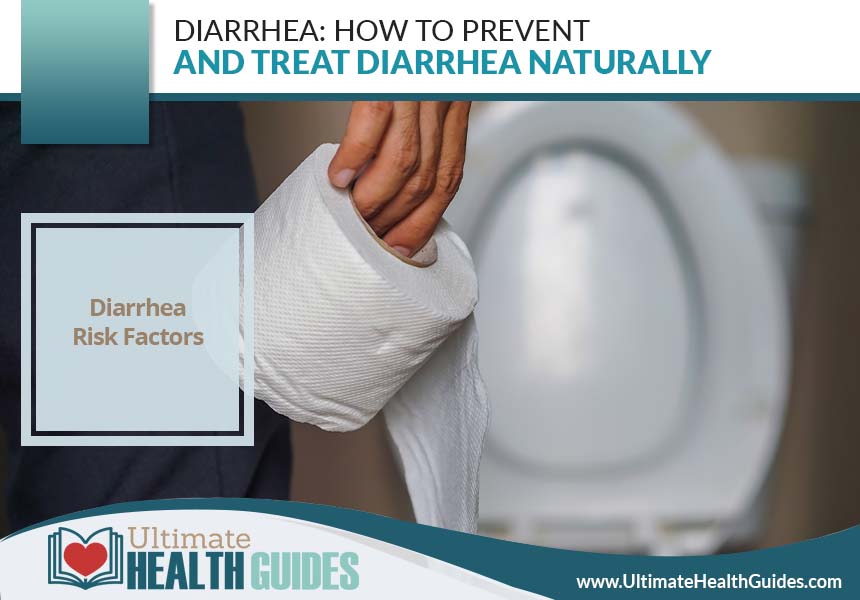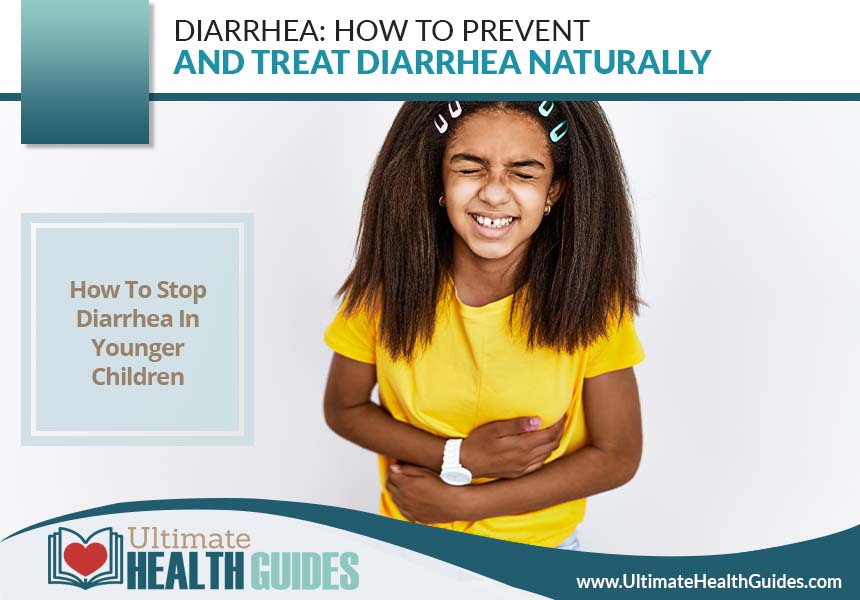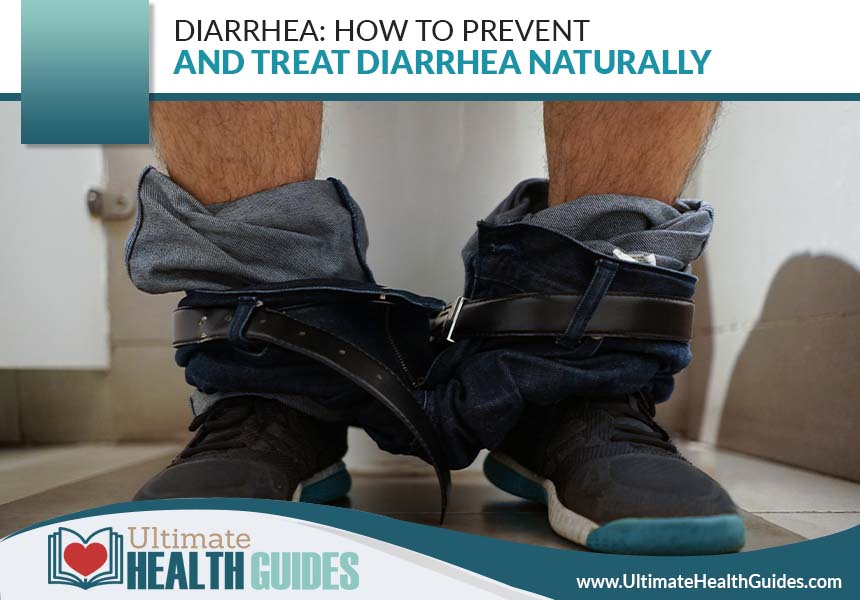Every person on earth has experienced a bout of diarrhea in their life. It’s an uncomfortable and sometimes embarrassing experience that can have a major impact on your daily routine. Diarrhea is usually caused by a virus, bacteria, or parasite and is your body’s way of getting rid of these invaders. Sometimes, diarrhea can also be caused by food intolerance or allergy.
There is a point where diarrhea can have a negative effect on your health, causing dehydration and other serious problems; it’s important to know the signs of when to seek medical help. Acute diarrhea comes on suddenly and usually lasts for less than three weeks. It can be caused by a virus, bacteria, or parasite; it can also be caused by food intolerance or allergy. Chronic diarrhea lasts for more than three weeks. Learn how to deal with diarrhea and more right now; just keep reading!

Causes Of Diarrhea
Diarrhea is the body’s reaction to many different conditions. Here are some of the most common causes.
• Bacteria: The most common cause of diarrhea is infection by bacteria, viruses, or parasites. These can be contracted through contaminated food or water or from contact with someone who is infected.
• Medications: Diarrhea can also be a side effect of certain medications, such as antibiotics.
• Food intolerances: Lactose intolerance is the most common food intolerance that causes diarrhea. Other intolerances include gluten and fructose.
• Infectious diseases: Diarrhea can be a symptom of many different infectious diseases, such as hepatitis A, typhoid fever, and cholera.
• Inflammatory bowel diseases: Inflammatory bowel diseases, such as Crohn’s disease and ulcerative colitis, can also cause diarrhea.
Dehydration is one risk of diarrhea, especially if it is severe or lasts for more than a few days. It is essential to drink plenty of fluids to replace those lost through diarrhea. More serious risks include electrolyte imbalance and malnutrition. In very rare cases, diarrhea can lead to complications, such as intestinal blockage or perforation.
The most common symptom of diarrhea is watery, loose stools. Here are the other symptoms.
• Abdominal pain or cramping
• Bloating or gas
• Fever
• Nausea or vomiting
• Weight loss
In most cases, diarrhea can be diagnosed based on the symptoms. A physical exam may also be done. In some cases, tests may be ordered to rule out other conditions or to determine the cause of diarrhea. These tests may include the following below.
• Blood tests
• Stool culture
• Imaging tests, such as CT scan or MRI
• Endoscopy or colonoscopy
There are several things you can do to help prevent diarrhea. Here are some ways.
• Wash your hands thoroughly and often, especially before eating or preparing food.
• Avoid contaminated food and water. Only eat food that has been cooked properly, and avoid tap water in countries where it is not safe to drink.
• Be cautious when traveling to developing countries. Only eat food that has been cooked properly, and avoid tap water.
• Make sure that your vaccinations are up to date. This can help protect you from some of the bacterial and viral infections that can cause diarrhea.
• If you are taking antibiotics, be sure to finish the entire course. Stopping early can allow bacteria to remain and cause an infection.

When To See A Doctor
If you have diarrhea that lasts for more than a few days or is accompanied by fever, blood in the stool, or severe abdominal pain, it is necessary to see a doctor. These may be signs of a more serious condition. Diarrhea can also lead to dehydration, so it is essential to drink plenty of fluids and seek medical attention if you are feeling faint, lightheaded, or dizzy.

Diarrhea Risk Factors
The most common cause of watery diarrhea in adults is a bacterial or viral infection. Here are other possible causes.
Food allergies: Some people may experience diarrhea after eating certain foods, such as dairy products, wheat, or soy.
Medications: Some medications can cause diarrhea as a side effect, such as antibiotics.
Food intolerances: Lactose intolerance is the most common food intolerance that causes diarrhea. Other intolerances include gluten and fructose.
Infections: Diarrhea can be caused by a variety of infections, such as viral gastroenteritis or food poisoning.
Inflammatory bowel diseases: Crohn’s disease and ulcerative colitis are two conditions that can cause inflammation in the intestines and lead to diarrhea.
Irritable bowel syndrome: This condition is a common cause of diarrhea. It is characterized by abdominal pain, cramping, as well as changes in bowel habits.
Malabsorption: This occurs when the intestines cannot absorb nutrients from food properly. Diarrhea can be a symptom of malabsorption.
Celiac disease: This is an autoimmune disorder that affects the small intestine. People with celiac disease cannot eat gluten, a protein found in wheat, barley, and rye. Eating gluten can cause diarrhea.
Cancer: Some types of cancer, such as lymphoma or colorectal cancer, can cause inflammation in the intestines and lead to diarrhea.
Certain medical conditions: Diarrhea can be a symptom of conditions such as liver disease, kidney failure, or diabetes.
Dehydration: Diarrhea can lead to dehydration, which can be dangerous. Symptoms of dehydration include dark urine, dizziness, and fatigue.
Age: Infants and young children are more likely to experience diarrhea than adults. This is because their immune systems are not yet fully developed.
Pregnancy: Some pregnant women experience diarrhea due to hormonal changes. It is important to drink plenty of fluids and seek medical attention if you are pregnant and have diarrhea.
Diarrhea can be a nuisance, but it is usually not serious; however, it can sometimes be a sign of a more serious condition. If you have diarrhea that lasts for more than a few days or is accompanied by other symptoms, it is essential to see a doctor. With infants, it is important to remember that their stool is loose to start with, so it is not always easy to tell when they have diarrhea. If your infant has watery, frequent, or bloody stools, fever, or vomiting, see a doctor right away. Dehydration is a serious concern in infants and young children.
If your baby’s diarrhea lasts longer than three days, is accompanied by a fever, or has blood in it, call the doctor. If your child is over six months old and has had diarrhea for more than two days, contact the doctor. Dehydration is also a concern for elderly adults. Symptoms of dehydration include dark urine, dizziness, and fatigue. If you are elderly and have diarrhea, it is essential to drink plenty of fluids and seek medical attention if you are feeling faint, lightheaded, or dizzy.

Ways To Naturally Stop Diarrhea At Home
Many times, it is easier and more convenient to treat your diarrhea at home with natural methods. Here are some of them.
Probiotics: Probiotics are live bacteria that are found in yogurt and other fermented foods. They can help restore the balance of good and bad bacteria in your gut, which can help prevent diarrhea.
Fiber: Fiber can help bulk up your stools and make them more solid. Eating high-fiber foods, such as fruits, vegetables, and whole grains, can help with diarrhea.
Water: Drinking plenty of fluids is necessary when you have diarrhea. Water is the best fluid to drink, but you can also drink clear broths, juices, and sports drinks. Avoid caffeine and alcohol.
Rest: When you have diarrhea, your body is trying to fight off an infection or inflammation. Resting will help your body heal.
Bland diet: Eating a bland diet can help with diarrhea. This includes foods such as rice, bananas, toast, and plain yogurt. Avoid spicy, fatty, or sugary foods.
Flaxseed oil: Flaxseed oil has anti-inflammatory properties that can help with diarrhea. You can take it in capsule form or add it to food.
Raw honey and ginger: Raw honey and ginger both have anti-inflammatory properties. You can take them in capsule form or add them to food or drinks.
Peppermint oil: Peppermint oil can help relax the muscles in your intestines and relieve diarrhea. You can take it in capsule form or add a few drops to water or tea.
Chamomile tea: Chamomile tea has anti-inflammatory properties and can help relax the muscles in your intestines.
Fennel seeds: Fennel seeds can help relieve gas and bloating, which can help with diarrhea. You can chew on a few seeds or add them to food.
Cinnamon: Cinnamon can help relieve gas and bloating, which can help with diarrhea. You can add it to food or drink it as tea.
Apple cider vinegar: Apple cider vinegar has probiotic properties that can help restore the balance of good and bad bacteria in your gut. You can take it in capsule form or add a few drops to water or tea.
Digestive enzyme supplement: Digestive enzymes help your body break down food. Taking a digestive enzyme supplement can help with diarrhea.
Herbal teas: Herbal teas, such as ginger tea, chamomile tea, and peppermint tea, can help relax the muscles in your intestines and relieve diarrhea.
Glutamine powder: Glutamine is an amino acid that can help repair the lining of your intestines. Taking glutamine powder can help with diarrhea.
Acupuncture: Acupuncture is a traditional Chinese medicine that can help relieve diarrhea.
Aloe vera juice: Aloe vera juice can help soothe the digestive tract and reduce inflammation.
Slippery elm bark: Slippery elm bark can help coat the lining of your digestive tract and reduce inflammation.
Try one or more of these home remedies for diarrhea and see which one works best for you. If your diarrhea persists for more than a few days or if you have blood in your stool, see your doctor. Diarrhea can be a symptom of a more serious condition, such as celiac disease, irritable bowel syndrome, or Crohn’s disease.

How To Stop Diarrhea In Younger Children
Infants get dehydrated more easily with diarrhea. So it is vital to seek medical attention if your child has diarrhea and is younger than six months old. If your child is older than six months, you can try one of the following home remedies for diarrhea.
Probiotics: Probiotics are live bacteria that are found in yogurt and other fermented foods. They can help restore the balance of good and bad bacteria in your gut, which can help prevent diarrhea.
Fiber: Adding fiber to your child’s diet can help bulk up their stools and make them more solid. Eating high-fiber foods, such as fruits, vegetables, and whole grains, can help.
Water: Drinking plenty of fluids is important when you have diarrhea. Water is the best fluid to drink, but you can also give your child clear fluids, such as chicken broth or apple juice. Avoid sugary drinks and juices with high fructose corn syrup.
Electrolyte drinks: Electrolyte drinks can help replace the electrolytes that are lost when you have diarrhea. They can also help prevent dehydration.
An infant’s immune system is also not as developed as an adult’s, so they are at risk of more serious complications from diarrhea. If your child has a fever, is vomiting, or has blood in their stool, see your doctor right away. Three percent of infants have an allergy to proteins in cow’s milk. If you think that your child might be allergic to cow’s milk, talk to your doctor about switching to a hypoallergenic formula. Your baby may develop a diaper rash or skin irritation from diarrhea; to help relieve the irritation, try using a barrier cream or ointment.

Things You Need To Be Cautious Of With Diarrhea
A few key things to remember if you have diarrhea are: drink lots of fluids, preferably clear ones such as water or broth, eat small meals more often instead of large ones, and stay away from greasy or fried foods. Caffeine and alcohol can also make dehydration worse, so it’s best to avoid them. If you have diarrhea, it is vital to see a doctor, as it may be a symptom of a more serious condition. Also, avoid dairy products and eating too much at once, as this can worsen diarrhea. If you are unable to keep fluids down, immediate medical attention is necessary, as dehydration might occur.
For children and infants, it is especially vital to take caution against dehydration. If a child younger than six months old has diarrhea, it is crucial to seek medical attention. For the elderly, malnutrition and dehydration are both significant risks associated with diarrhea. Therefore, if you are an older adult experiencing this symptom, be sure to speak with your doctor about potential underlying conditions, such as celiac disease or Crohn’s disease.

Diarrhea is a common ailment that can be caused by a variety of things, such as infection, food poisoning, or an allergy. It can often be treated with simple home remedies; however, if it persists for more than a few days or is accompanied by other symptoms, you should see your doctor. Diarrhea can be a sign of a more serious condition. Therefore, it is vital to be aware of the potential risks associated with it. If you have diarrhea, drink plenty of fluids, eat small meals more often, and avoid dairy products.














